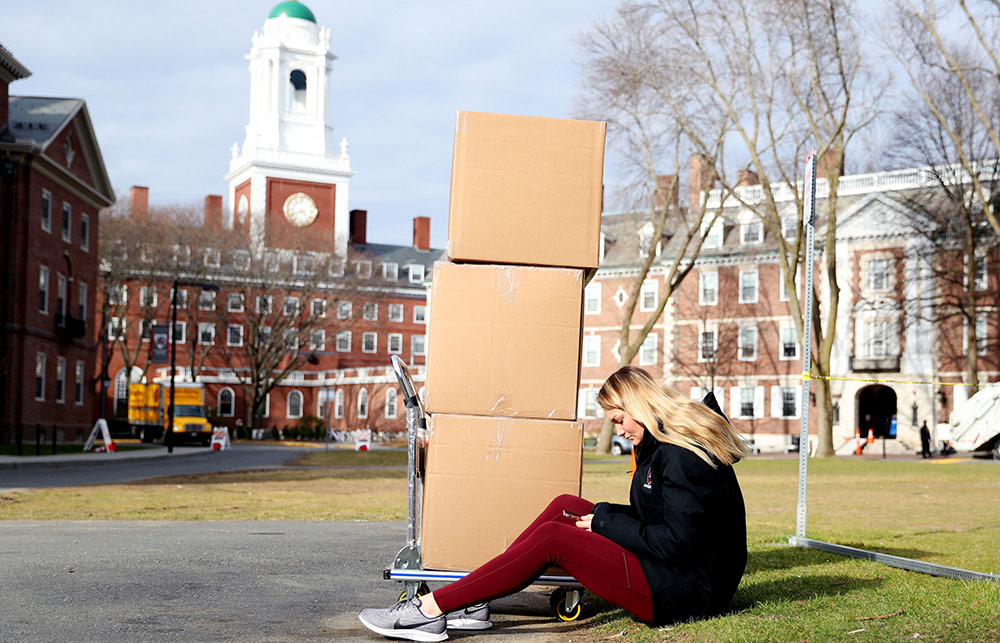疫情救助计划不应该忽视大学生的困境

为了缓解新冠疫情给美国人带来的经济压力,美国国会最近通过了多个财政刺激法案,总规模超过数万亿美元。
但这些救济计划都没有考虑到大学生这个群体。
例如,通过经济影响补助金,年收入低于7.5万美元的美国人大部分已经领到(或很快就能领到)1,200美元刺激资金,而年收入不足15万美元的夫妇可以领取2,400美元。一对夫妇如果有未满16岁的子女,每个子女还可以额外领取500美元。这意味着17至24岁的青年,虽然父母在报税时仍把他们作为被抚养人,却没有资格领取刺激资金。
大学生们正是处在这种尴尬的境地,他们既不被认为是成年人,也不再被看做是孩子。换言之,《冠状病毒援助、救济和经济安全法案》(《CARES法案》)没有为他们提供直接财务援助,而他们的父母也无法代表他们领取任何补助。
议员们必须改变这种境况。据美国国家教育统计中心的数据,美国约有在读本科生1,690万人。许多人的生活受到COVID-19疫情的影响陷入混乱。学校封校,要求学生离校,在学校里勤工助学的学生们也因此失去了工作。疫情爆发时,有成千上万大学生已经背负上了债务。美国大学入学及成功协会的报告显示,2018年,为学业贷款的美国大学毕业生平均背负的债务为2.9万美元左右。
虽然有人上大学可以获得奖学金,但笔者很清楚大学生们的财务困境。笔者申请信用卡、汽车贷款或其他借款时,曾一次次被贷款方拒绝。当我搬到校外居住时,经常被房东拒绝,因为他们要求缴纳的押金超过我的承受能力。我撑过了那段艰难的时期。
现在许多学生面临着与我类似的情况,甚至他们的遭遇可能更加糟糕。当学校封校的时候,并非所有学生都有安全的家可回,他们甚至可能无家可归,也并非所有家长都能在学生提出要求的时候,通过Venmo给他们转账。
国会议员们认为,大学生们作为被抚养人不需要为自己的财务状况负责,并以此为理由把他们排除在救济计划以外。参议院财政委员会的发言人告诉《华尔街日报》:“顾名思义,作为被抚养人,大部分财务支持不需要由他们负责。发放补贴的目的是在疫情期间,为需要对自己的或其他人的财务状况负责的人提供支持。”参议院财政委员会负责起草了《CARES法案》。
但许多大学生所遭遇的财务困境不比任何人轻松。对华盛顿州28所社区大学和技术院校超过1.3万名学生的调查发现,41%的学生曾在过去30天遭遇过“食不果腹”。皮尤研究中心(Pew Research Center)分析国家教育统计中心的数据发现,2015年至2016年,31%的本科生生活在贫困线以下。
目前确实有一些计划能够缓解学生的困境。比如《CARES法案》中拿出62.8亿美元作为紧急拨款,帮助因新冠疫情生活陷入混乱的学生们支付教育资料费、住宿费等支出。本月初,由明尼苏达州民主党参议员缇娜·史密斯领导的一批参议员提交了《被抚养人全覆盖法案》。该法案允许大学生的家长(以及赡养成年被抚养人的其他人)领取500美元补助。
这些努力的出发点和效果当然值得称赞,但还远远不够。国会应该通过新版《CARES法案》,允许大学生像其他美国成年人一样,领取1,200美元补助金。
大学生们将成为议员、医生、记者,他们是未来几十年国家的建设者。在当前历史性的经济衰退期间,如果政府不能像对待其他人一样,为他们提供经济支持,这对于美国的未来又预示着什么呢?(财富中文网)
本文作者Hao Liu是芝加哥公司Boro的联合创始人兼CEO。Boro是一家面向大学生的金融技术初创公司。
翻译:刘进龙
审校:汪皓
为了缓解新冠疫情给美国人带来的经济压力,美国国会最近通过了多个财政刺激法案,总规模超过数万亿美元。
但这些救济计划都没有考虑到大学生这个群体。
例如,通过经济影响补助金,年收入低于7.5万美元的美国人大部分已经领到(或很快就能领到)1,200美元刺激资金,而年收入不足15万美元的夫妇可以领取2,400美元。一对夫妇如果有未满16岁的子女,每个子女还可以额外领取500美元。这意味着17至24岁的青年,虽然父母在报税时仍把他们作为被抚养人,却没有资格领取刺激资金。
大学生们正是处在这种尴尬的境地,他们既不被认为是成年人,也不再被看做是孩子。换言之,《冠状病毒援助、救济和经济安全法案》(《CARES法案》)没有为他们提供直接财务援助,而他们的父母也无法代表他们领取任何补助。
议员们必须改变这种境况。据美国国家教育统计中心的数据,美国约有在读本科生1,690万人。许多人的生活受到COVID-19疫情的影响陷入混乱。学校封校,要求学生离校,在学校里勤工助学的学生们也因此失去了工作。疫情爆发时,有成千上万大学生已经背负上了债务。美国大学入学及成功协会的报告显示,2018年,为学业贷款的美国大学毕业生平均背负的债务为2.9万美元左右。
虽然有人上大学可以获得奖学金,但笔者很清楚大学生们的财务困境。笔者申请信用卡、汽车贷款或其他借款时,曾一次次被贷款方拒绝。当我搬到校外居住时,经常被房东拒绝,因为他们要求缴纳的押金超过我的承受能力。我撑过了那段艰难的时期。
现在许多学生面临着与我类似的情况,甚至他们的遭遇可能更加糟糕。当学校封校的时候,并非所有学生都有安全的家可回,他们甚至可能无家可归,也并非所有家长都能在学生提出要求的时候,通过Venmo给他们转账。
国会议员们认为,大学生们作为被抚养人不需要为自己的财务状况负责,并以此为理由把他们排除在救济计划以外。参议院财政委员会的发言人告诉《华尔街日报》:“顾名思义,作为被抚养人,大部分财务支持不需要由他们负责。发放补贴的目的是在疫情期间,为需要对自己的或其他人的财务状况负责的人提供支持。”参议院财政委员会负责起草了《CARES法案》。
但许多大学生所遭遇的财务困境不比任何人轻松。对华盛顿州28所社区大学和技术院校超过1.3万名学生的调查发现,41%的学生曾在过去30天遭遇过“食不果腹”。皮尤研究中心(Pew Research Center)分析国家教育统计中心的数据发现,2015年至2016年,31%的本科生生活在贫困线以下。
目前确实有一些计划能够缓解学生的困境。比如《CARES法案》中拿出62.8亿美元作为紧急拨款,帮助因新冠疫情生活陷入混乱的学生们支付教育资料费、住宿费等支出。本月初,由明尼苏达州民主党参议员缇娜·史密斯领导的一批参议员提交了《被抚养人全覆盖法案》。该法案允许大学生的家长(以及赡养成年被抚养人的其他人)领取500美元补助。
这些努力的出发点和效果当然值得称赞,但还远远不够。国会应该通过新版《CARES法案》,允许大学生像其他美国成年人一样,领取1,200美元补助金。
大学生们将成为议员、医生、记者,他们是未来几十年国家的建设者。在当前历史性的经济衰退期间,如果政府不能像对待其他人一样,为他们提供经济支持,这对于美国的未来又预示着什么呢?(财富中文网)
本文作者Hao Liu是芝加哥公司Boro的联合创始人兼CEO。Boro是一家面向大学生的金融技术初创公司。
翻译:刘进龙
审校:汪皓
To ease the financial suffering of Americans during the coronavirus pandemic, the U.S. Congress recently passed numerous stimulus bills totaling hundreds of billions of dollars.
Yet college students were all but forgotten by each subsequent relief package.
For instance, through the Economic Impact Payments, most individuals making under $75,000 a year have received (or will soon receive) $1,200 in stimulus funds, while married couples making under $150,000 will get $2,400. Parents with children 16 and under are eligible for an additional $500 per child, meaning that anyone aged 17 to 24 who’s claimed as a dependent on their parents’ taxes is ineligible for stimulus funds.
College students are stuck in a position where they’re not considered adults and they’re not considered children. In other words, the CARES Act gave them no direct financial relief, nor did it give their parents any on their behalf.
Lawmakers must change this. There are an estimated 16.9 million students enrolled in undergraduate programs in the U.S., according to the National Center for Education Statistics. Many have had their lives thrown into chaos by the COVID-19 pandemic. They’ve been asked to leave campus as colleges went into lockdown, and students who have relied on campus jobs to finance their degrees have seen those jobs disappear as campuses closed. Hundreds of thousands of students were already in debt when COVID-19 hit, and in 2018, the average college graduate in the U.S. with student debt owed about $29,000, according to a report by the Institute for College Access & Success.
As someone who went to college on a scholarship, I know the financial struggles that students endure. When I applied for credit cards, car loans, or other forms of lending, creditors rejected me, time and again. When I moved off campus, I got rejected by landlords who wanted larger deposits than I had, time and time again. I made it through those times.
There are many students today in similar—or worse—situations. Not every student has a safe or accessible home they can return to when their campus closes, and not every student has parents that can Venmo them money whenever they ask.
Officials in Congress have used the notion that college students aren’t responsible for their own financial well-being to justify leaving dependents out of the relief package. “Dependents, by definition, aren’t responsible for a majority of their financial support,” a spokesperson for the Senate Finance Committee, which wrote the CARES Act, told the Wall Street Journal. “The goal of the recovery rebates is to provide support for Americans who are responsible for their own financial well-being or that of another during this pandemic.”
But many college students experience financial hardships as acutely as anyone. A survey of over 13,000 students at 28 community and technical colleges in Washington State found that 41% of students reported being food insecure at some point in the last 30 days. And Pew Research Center analysis of National Center for Education Statistics data found that, in 2015 to 2016, 31% of all undergraduate students were living in poverty.
There are some promising efforts to bring relief to students. The CARES Act did set aside $6.28 billion for emergency grants to students whose lives have been upended by the coronavirus to help them cover costs of educational materials, housing, and other expenses. A group of U.S. Senators, led by Sen. Tina Smith (D-Minn.), also introduced the All Dependents Count Act earlier this month, which would allow the parents of college students (along with others who are in charge of adult dependents) to collect a $500 credit.
While well-intentioned and helpful, these efforts aren’t enough. Congress should pass a version of the CARES Act that provides college students with the full $1,200 that other American adults are already receiving now.
College students are the next generation of lawmakers, doctors, journalists, and others who will build the road forward in the coming decades. If we don’t offer them the same support we’re giving others, in the midst of this historic recession, how does that bode for the future of our country?
Hao Liu is cofounder and CEO of Boro, a Chicago-based financial technology startup for college students.













